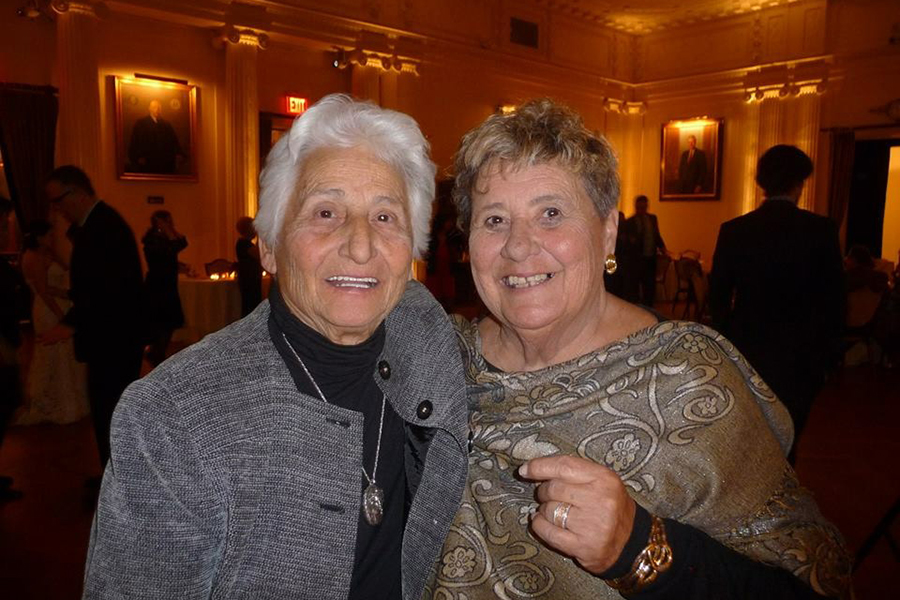“Love Wins” is a sweet documentary short that chronicles the lives and relationship of Emily Sonnessa and Janice Lobravico through interviews and photographs. The film had its world premiere June 2 at House of Independents in Asbury Park.
The couple, who has been together for 45 years, met back when Lobravico was married. One of the highlights in the film has Sonnessa delighting in recounting the story of her first encounter with the woman who would eventually become her wife.
In the film, the pair discusses their childhoods, coming out in an era where it was not safe to be openly gay and the fact that they lived together in Rutherford, N.J., but remained closeted. In fact, they did not even acknowledge their relationship in their own home where they raised Lobravico’s three children.
Director Robin Kampf paints a loving, moving portrait of two octogenarians who went from living in secret to becoming activists, marching on Trenton after moving to the queer-friendly community of Ocean Grove, N.J. With the passage of marriage equality, the women eventually married.
Kampf spoke with PGN about the inspirational couple featured in “Love Wins.”
PGN: How did you meet Emily and Jan and get them to trust you?
RK: I met Emily and Jan through my wife, Luanne, who is an activist (and was a board member) with Garden State Equality. I, too, lived that life behind closed doors, and kept things hidden. We lived like that for many years. It was through Garden State Equality and marching on Trenton that I met Jan and Emily. They became activists when they moved to Ocean Grove. When New Jersey finally got marriage equality after a long, hard fight, Jan and Emily sent out their wedding announcements, and they invited Luanne and me. It was the first gay wedding I attended. I’m not someone who cries in public, but I was bawling my eyes out. I was so moved by their story because it resonated with my own. At the reception, I said I was a filmmaker and I wanted to get to know them and tell their story. I went over to their house, we had cocktails, and I asked if I could tell their story. I spent the next two years with them.
PGN: You chronicle several decades of these women’s lives in 25 minutes. What did you see as the focus of the film?
RK: I wanted to capture what many of us went through. This younger generation won’t have to endure things like we did. I saw what characters Jan and Emily were. They were the epitome of being in the closet, both in suburban New Jersey, but also inside their own house as well. They did that for 20 years. Once a year, they went off to Provincetown for a week to be themselves.
PGN: What can you say about the transformation of these women, who went from being cautious queer teenagers and young women who went to clubs that were raided, to having a public civil union and marriage?
RK: I knew I wanted to capture going to gay bars and being fearful of police raids. Jan and Emily would go in to New York and experience the raids in the clubs. I saw the pictures and know the Stonewall history but I never knew anyone who was frisked in a club and told that they might be arrested. If I tell younger kids you couldn’t hold hands in public, they can’t believe it. When I was a kid, there were white water fountains. That’s what I equate this to; it’s the same oppression. To live your life in the closet inside and outside your house must have been horrible!
PGN: Jan and Emily mention some rough periods in their lives. Regarding their kids, one was apparently unhappy with the true nature of their relationship. Yet your film does not dwell on many of their difficulties. Was that a deliberate decision?
RK: Yes. I didn’t want it to be a macabre film. Their story is inspiring and beautiful, so I didn’t want to focus on that negativity. I wanted to emphasize the positive. They lived with a lot of pain over 45 years together. Now that they are happy and are married, I didn’t want them to relive that pain. I wanted to celebrate their lives.
PGN: Jan and Emily’s story reflects the societal change. To what do you attribute the shift in their experiences?
RK: I thought that given their background and heritage — being Italian-American — their story begins when they were born. Emily had seven brothers and sisters. They were born into a heritage that was completely counter to the one they have now. That’s probably why they were able to march on Trenton — because they outlived their parents, sisters and brothers.

